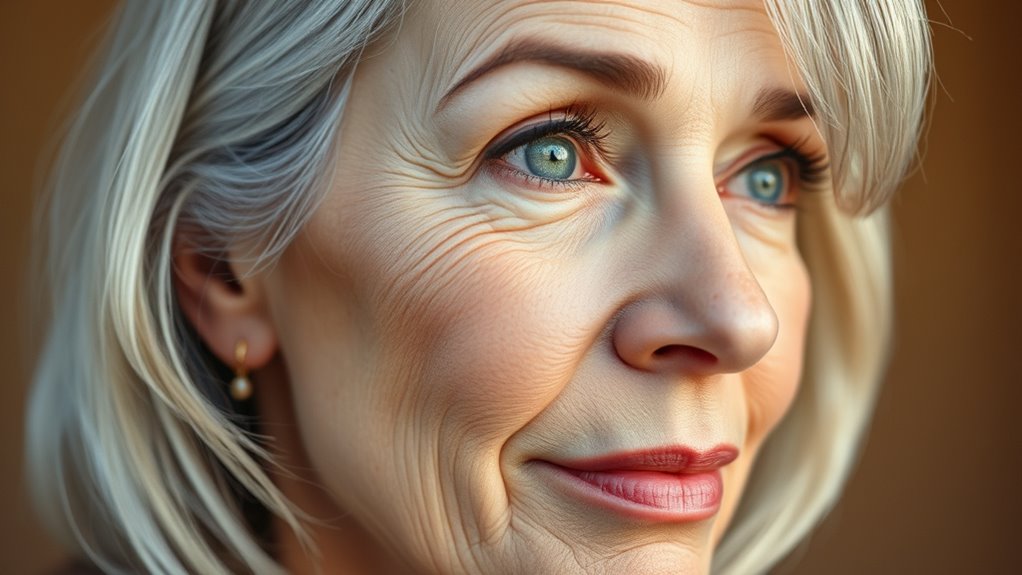During menopause, your skin produces less collagen and becomes drier, thinner, and less elastic due to declining estrogen levels. To manage these changes, use skincare products with antioxidants, hyaluronic acid, and retinoids, and always wear broad-spectrum sunscreen. Maintain good hydration, eat a balanced diet rich in vitamins, and avoid smoking or excessive alcohol. For more tips on keeping your skin vibrant, keep exploring how you can adapt your skincare routine to these changes.
Key Takeaways
- Use skincare products with antioxidants, retinoids, and hyaluronic acid to support collagen and hydration.
- Maintain hydration and consume a balanced diet rich in vitamins C, E, and omega-3 fatty acids.
- Protect skin from UV damage with broad-spectrum sunscreen and avoid harsh skincare routines.
- Consider professional treatments like chemical peels or laser therapy to improve skin firmness and texture.
- Consult dermatologists for personalized skincare plans and explore hormone therapy options if appropriate.

Menopause brings important changes to your body, and your skin is no exception. As hormone levels fluctuate and decline, you’ll notice shifts in how your skin looks and feels. One of the main factors behind these changes is hormonal effects, particularly the decrease in estrogen. Estrogen plays a key role in maintaining skin health by promoting collagen production, supporting skin elasticity, and keeping your skin hydrated. When estrogen levels drop during menopause, your skin’s ability to regenerate and repair diminishes, leading to visible signs of aging.
You might observe your skin becoming thinner, drier, and less supple. The loss of skin elasticity becomes more evident as the supportive collagen fibers weaken, making your skin less firm and more prone to sagging and fine lines. This reduction in skin elasticity is a natural consequence of decreased collagen synthesis, which estrogen actively stimulates when your hormone levels are balanced. Without sufficient estrogen, your skin’s structure weakens, and you may notice increased wrinkles and a less youthful appearance.
Managing these changes requires understanding that hormonal effects are at the core of skin aging during menopause. While you can’t reverse hormonal decline entirely, there are steps you can take to support your skin’s health. Using skincare products rich in antioxidants, retinoids, and hyaluronic acid can help boost collagen production and improve skin hydration. Regularly applying moisturizers that contain ingredients like glycerin or ceramides helps lock in moisture, combating dryness caused by hormonal shifts. Sunscreen is also essential; UV exposure accelerates collagen breakdown, further diminishing skin elasticity. Wearing broad-spectrum SPF daily protects your skin and slows down aging signs.
Lifestyle choices play an essential role in managing skin changes. Staying well-hydrated, eating a balanced diet rich in vitamins C and E, and including foods high in omega-3 fatty acids support skin health from within. Avoiding smoking and excessive alcohol consumption is crucial, as these habits can worsen skin aging and further impair elasticity. Gentle skincare routines, avoiding harsh soaps or scrubbing, help maintain your skin’s natural barrier and prevent additional dryness or irritation. Incorporating antioxidants into your skincare routine can further combat oxidative stress that accelerates collagen breakdown.
Finally, don’t hesitate to consult dermatologists or skincare professionals if you’re concerned about the changes you see. They can recommend treatments like chemical peels, laser therapy, or hormone replacement options that may help restore some skin firmness and vibrancy. Remember, while hormonal effects are inevitable during menopause, proactive skincare and healthy habits can notably slow down the loss of skin elasticity and keep your skin looking its best for years to come.
Frequently Asked Questions
How Does Menopause Affect Skin Elasticity Over Time?
Menopause causes your skin elasticity to decline due to collagen depletion and elastic fiber loss. As estrogen levels drop, your body produces less collagen, making your skin thinner and less firm. The loss of elastic fibers further reduces your skin’s ability to bounce back, leading to sagging and wrinkles over time. To combat this, consider using skincare products with collagen-boosting ingredients and protect your skin from sun damage.
Are There Specific Skincare Ingredients Recommended During Menopause?
During menopause, you should consider skincare ingredients like retinol and hyaluronic acid. Retinol benefits include boosting collagen production, reducing fine lines, and improving skin texture, while hyaluronic acid helps retain moisture and plump your skin. Using these ingredients regularly can counteract elasticity loss and dryness caused by hormonal changes. Make certain you start with gentle formulations and consult a dermatologist to tailor a routine suited to your skin’s evolving needs.
Can Menopause-Related Skin Changes Be Reversed Completely?
Like a delicate tapestry, menopause-related skin changes may not be fully reversed, but you can restore its vibrant hues through nurturing care. While hormonal balance plays a crucial role in skin rejuvenation, it’s unlikely to completely erase every change. Still, consistent skincare, healthy habits, and targeted treatments can markedly improve your skin’s texture and glow. Embrace this chapter as an opportunity for renewal rather than a final chapter of decline.
How Does Hormonal Therapy Influence Skin Health?
Hormonal therapy benefits your skin by improving hydration and elasticity, making it look more youthful. It works by balancing estrogen levels, which decline during menopause and cause skin issues. As a result, you may notice reduced dryness, fewer wrinkles, and an overall healthier appearance. By maintaining proper hormone levels, hormonal therapy helps you manage skin changes effectively, giving you a boost in confidence and comfort.
What Lifestyle Changes Best Support Skin During Menopause?
Keep your skin in top shape by making smart lifestyle changes. Focus on diet modifications rich in antioxidants, omega-3s, and hydration to nourish your skin from within. Don’t forget to manage stress effectively, as it can take a toll on your skin’s health. Remember, a healthy lifestyle is the foundation—when you take care of yourself, your skin will thank you and glow naturally.
Conclusion
As you navigate menopause’s changes, your skin tells a story—one that’s still being written. With each new chapter, you hold the pen, choosing how to care for your skin’s future. Will you embrace nourishing routines and protect its glow? Or let time’s whispers fade your radiance? The choice is yours, and the next page is waiting. Step forward confidently, knowing your skin’s best days are still ahead—ready to surprise you.









